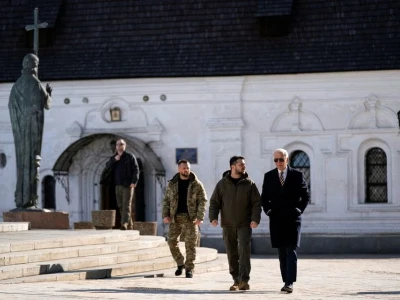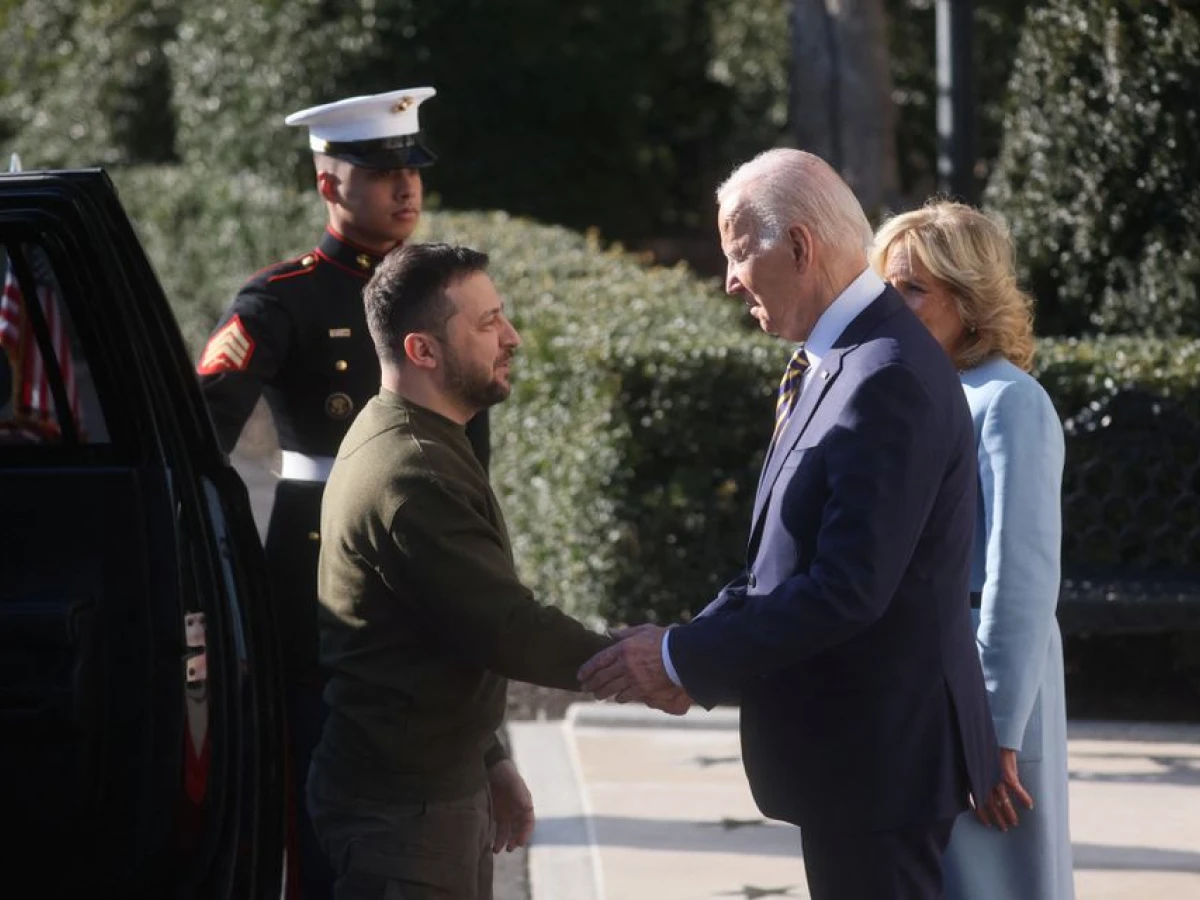
Biden and Zelenskiy show solidarity at White House in first wartime visit
Russia says it is waging a "special military operation" in Ukraine to rid it of nationalists and protect Russian-speaking communities.
WASHINGTON/KYIV, Dec 21 (Reuters) - Presidents Volodymyr Zelenskiy and Joe Biden showed solidarity at the White House on Wednesday in the first foreign trip of the war for the Ukrainian leader, as the United States announced new military aid including Patriot missiles.
Zelenskiy plans to seek more support during the trip. The Ukrainian president, wearing his trademark olive green pants and sweater, Biden and first lady Jill posed on the White House lawn before the two leaders spoke at the Oval Office in front of reporters.
"It's an honor to be by your side in the united defense against what is a brutal, brutal war," said Biden of Europe's biggest land conflict since World War Two, which has killed tens of thousands, driven millions from their homes and reduced cities to ruins.
"It's hard to believe: 300 days," Biden said of the invasion. Some in Moscow expected the campaign to achieve a rapid victory; instead the conflict has ground on.
"The war is not over," Zelenskiy told Biden, presenting him with a medal as he expressed gratitude for the U.S. president's role in helping Ukraine and rallying support.
"Thanks from our ordinary people to your ordinary people, Americans."
The pair will participate in a joint news conference after talks then go to Capitol Hill to address a joint session of the U.S. Senate and House of Representatives.
Earlier, U.S. Secretary of State Antony Blinken announced the United States would provide another $1.85 billion in military aid for Ukraine including a Patriot air defence system to help it ward off barrages of Russian missiles.
Ukraine in recent weeks has come under repeated Russian missile and drone strikes targeting its energy infrastructure, leaving millions of people without electricity or running water in the dead of a freezing winter.
The Patriot missile is deemed to be one of the most advanced U.S. air defence systems, offering protection against attacking aircraft as well as cruise and ballistic missiles.
Zelenskiy's political adviser Mykhailo Podolyak said the visit would allow Ukraine to explain the need for more advanced weaponry. Some U.S. Republicans have expressed skepticism.
"...Weapons, weapons and more weapons," he told Reuters in written comments about goals for the trip. "In particular, armoured vehicles, the latest missile defence systems and long-range missiles."
Zelenskiy has made a point of staying close to his people during the war and advocating for his former Soviet state on the world stage, with daring trips to battlefronts, countless calls with world leaders and videolink speeches to parliaments and international institutions.
White House National Security Council spokesman John Kirby told MSNBC that diplomacy would be discussed with Zelenskiy, but the Ukrainian leader would face no pressure for peace talks.
Kirby said Washington was seeing no sign that Russian President Vladimir Putin was willing to engage in peacemaking.
"Clearly we're going to make sure that President Zelenskiy, when he leaves this country, knows that he's leaving with the full support of the United States going forward," Kirby told MSNBC in a separate interview earlier.
The Kremlin said on Wednesday it saw no chance of peace talks with Kyiv. In a call with reporters, spokesman Dmitry Peskov said that continued Western arms supplies to Ukraine would lead to a "deepening" of the conflict.
Russia says it is waging a "special military operation" in Ukraine to rid it of nationalists and protect Russian-speaking communities. Ukraine and the West describe the Kremlin's actions as an unprovoked war of aggression.
FIX PROBLEMS, PUTIN TELLS ARMY
Putin was defiant on Wednesday at an end-of-year meeting of top defence chiefs, saying Russian forces were fighting like heroes in Ukraine, would be equipped with modern weapons and would achieve all Moscow's goals.
Russia invaded Ukraine on Feb. 24 aiming to capture the capital Kyiv in days, a goal that quickly proved out of reach.
Moscow then focused on advancing along eastern and southern fronts but has suffered a string of battlefield defeats since the summer - amid widespread reports of disorganisation, poor training and shoddy gear. Putin on Tuesday conceded that conditions in Russian-held areas were "highly complicated".
In his remarks on Wednesday, Putin said there were no financial limits on what the government would provide in terms of equipment and hardware, but the army had to learn from and fix the problems it had experienced in Ukraine.
He gave his backing to a plan by his defence minister to boost the size of the armed forces by more than 30% to 1.5 million combat personnel.
Putin also said he still considered Ukrainians to be a "brotherly" people.
He blamed the war on "third countries (seeking) the disintegration of the Russian world", revisiting a familiar theme. The West has rejected this as nonsense, calling Russian actions in Ukraine an imperial-style land grab.
With the United States the largest military aid donor to Ukraine among Western allies, the Biden administration has provided about $20 billion in assistance to Kyiv, including artillery ammunition, munitions for NASAMS air defence systems and for high mobility artillery rocket systems (HIMARS).
Zelenskiy has repeatedly called on the West to supply more advanced weaponry, ranging from modern battle tanks to missile defence systems, but Western allies have been cautious, keen to minimise any risk of provoking wider conflict with Russia.
Related
Related
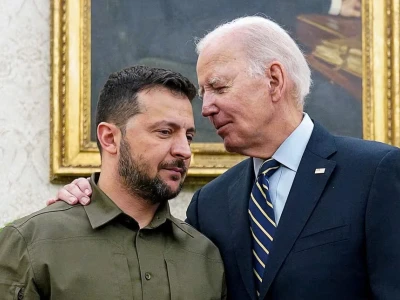
Biden invites Zelenskiy to White House for Dec 12 meeting
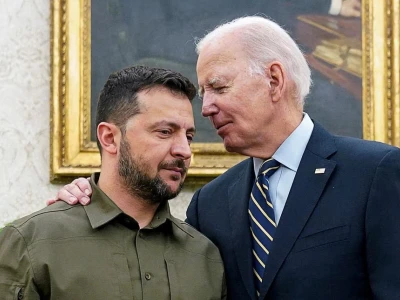
US will send Ukraine ATACMS long-range missiles
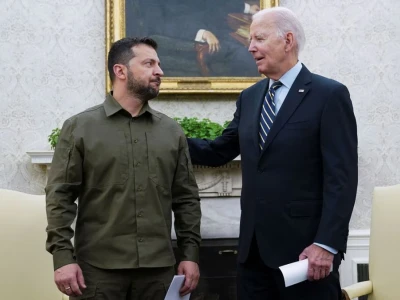
In Washington, Zelenskiy courts Congress, Biden on military aid
